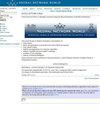Floppy logic as a generalization of standard Boolean logic
IF 0.9
4区 计算机科学
Q4 COMPUTER SCIENCE, ARTIFICIAL INTELLIGENCE
引用次数: 0
Abstract
The topic of this article is a floppy logic, a new multi-valued logic. Floppy logic is related to fuzzy logic and the theory of probability, but it also has interesting links to probability logic and standard Boolean logic. It provides a consistent and simple theory that is easy to apply in practice. This article examines the isomorphism theorem, which plays an important role in floppy logic. The theorem is described and proved. The most important consequences of the isomorphism theorem are: 1) All statements which are equivalent in standard Boolean logic are also equivalent in floppy logic. 2) Floppy logic has all the properties of standard Boolean logic which can be formulated as an equivalence. These include, for example, distributivity, the contradiction law, the law of excluded middle, and others. The article mainly examines floppy implication. We show that floppy implication does not satisfy Adam’s Thesis and that floppy logic is not limited by Lewis’ triviality result. We also present a range of inference rules which are generalizations of modus ponens and modus tollens. These rules hold in floppy logic, and of course, also apply to standard Boolean logic. All these results lead us to the notion that floppy logic is a many-valued generalization of standard Boolean logic.软盘逻辑是标准布尔逻辑的概括
本文的主题是一种新型的多值逻辑——软盘逻辑。软盘逻辑与模糊逻辑和概率论有关,但它也与概率逻辑和标准布尔逻辑有有趣的联系。它提供了一种易于在实践中应用的一致而简单的理论。本文研究了在软盘逻辑中起重要作用的同构定理。对该定理进行了描述和证明。同构定理最重要的结论是:1)所有在标准布尔逻辑中等价的语句在软盘逻辑中也等价。2)软盘逻辑具有标准布尔逻辑的所有属性,可以用等价形式表示。例如,分配律、矛盾律、排中律等等。本文主要考察软盘含义。我们证明了软盘蕴涵不满足亚当命题,软盘逻辑不受刘易斯琐屑性结果的限制。我们还提出了一系列推理规则,这些规则是对模量和模量的推广。这些规则适用于软盘逻辑,当然也适用于标准布尔逻辑。所有这些结果使我们得出软盘逻辑是标准布尔逻辑的多值泛化的概念。
本文章由计算机程序翻译,如有差异,请以英文原文为准。
求助全文
约1分钟内获得全文
求助全文
来源期刊

Neural Network World
工程技术-计算机:人工智能
CiteScore
1.80
自引率
0.00%
发文量
0
审稿时长
12 months
期刊介绍:
Neural Network World is a bimonthly journal providing the latest developments in the field of informatics with attention mainly devoted to the problems of:
brain science,
theory and applications of neural networks (both artificial and natural),
fuzzy-neural systems,
methods and applications of evolutionary algorithms,
methods of parallel and mass-parallel computing,
problems of soft-computing,
methods of artificial intelligence.
 求助内容:
求助内容: 应助结果提醒方式:
应助结果提醒方式:


